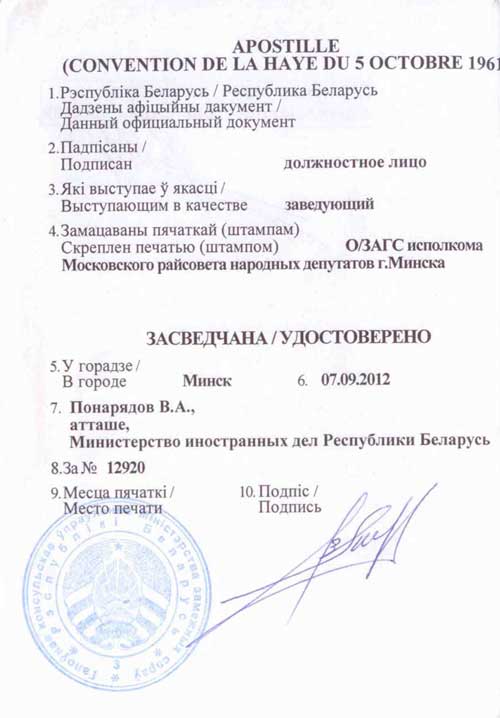
Schmidt & Schmidt offers apostille and legalization services for official documents issued in Belarus.
The Republic of Belarus is a party to the Hague Convention of October 5, 1961, which allows for a simplified document legalization procedure through apostille. Belarus joined the Hague Convention on the Simplification of Legalization of Documents in 1992. Under the Hague Convention, documents issued by government authorities of one of the Convention’s member countries are valid in another member country without consular legalization, provided they bear an apostille.
An apostille certifies the authenticity of the signature, the capacity in which the person signing the document acted, and, where appropriate, the authenticity of the seal or stamp affixed to the document.
In Belarus, an apostille is a quadrilateral stamp of at least 9×9 cm in the Belarusian language, containing the mandatory heading “Apostille” and a reference to the Hague Convention of 1961 in French (Convention de La Haye du 5 octobre 1961).

Responsible for issuing the apostille are the following institutions:
- Ministry of Education for documents issued by education institutions
- Ministry of Justice for judicial documents
- Archive offices
- Ministry of Foreign Affairs
The process of legalizing documents with an apostille in Belarus foresees that the Competent Authority checks and certifies the authenticity of the signature on the underlying public document, the capacity in which the person signing the document has acted, and the identity of the seal or stamp which the document bears (if any). Afterwards a certificate with a stamp "apostille" is attached to the document. As a rule, the apostille is placed on the reverse side of the original document or on a separate sheet and gets affixed to it.
The apostille is a stamp in the shape of a square. It should be filled in in the official languages of the issuing authority. The heading "Apostille (Convention de la Haye du 5 octobre 1961)" written in French is a mandatory requirement for an apostille's validity.
For the following documents an apostille can be issued:
- Certificates of civil status (certificates of birth, death, marriage and divorce)
- Education documents (school reports, certificates, diplomas)
- Extracts from the commercial register
- Judicial decisions
- Notarially certified copies of documents
- Notarially certified translations
- Further notarial documents (authorizations, last will, declarations)
- Commercial documents legalized by a state organ of registration (articles of incorporation, registration certificates, tax registrations etc.)
Requirements for the documents:
An apostille can be exclusively issued for the original document. Therefore, the latter must be presented in a good condition, with all stamps and signatures clearly visible and readable. Furthermore, it must not contain alien markings or labels.
Exemption from apostille and consular legalization
According to Article 13 of the Convention on Legal Assistance and Legal Relations in Civil, Family and Criminal Matters (also known as the Minsk Convention), which is in force in the territories of its signatory states, documents issued in the participating countries do not require legalization.
The participating countries of the Convention are: Azerbaijan, Armenia, Belarus, Georgia, Kazakhstan, Kyrgyzstan, Moldova, Russia, Tajikistan, Turkmenistan, Uzbekistan, and Ukraine.
Belarus has been a party to the Minsk Convention since 1993. For these states, the legalization of documents issued in Belarus by means of an apostille is not required.
To use documents issued in Belarus on the territory of the above-mentioned countries, it is necessary to obtain a notarized translation.
Due to the high demand for this service, as well as the workload of government authorities that now accept applications by appointment, the apostille procedure currently takes more than 9 months.
Consular legalization in Belarus
If a document is to be used in a country that does not recognize the Hague Convention it is subject to consular legalization. A complete list of countries that accept and use apostilles can be found here.
Consular legalization is a more time-consuming and costly procedure than obtaining an apostille. The procedure for legalizing documents issued in Belarus is as follows:
It is important to note that the document will have legal force only in the territory of the country whose consular mark it bears, and it cannot be used in other states.
Unlike apostille certification, consular legalization can be applied not only to official and notarial documents, but also to commercial documents, provided they are certified by the Chamber of Foreign Trade.
The validity period of consular legalization is generally unlimited; however, restrictions may apply to the validity period of the documents themselves.
Additional services
In addition to the legalization of your documents, we can provide you with high quality translations.
Should you require company information for the court, it needs be legalised as well. We are therefore offering extracts from the commercial register of Belarus including apostillation and translation.
Usually, processing the documents takes us 14 days.
Courier services are charged and invoiced separately according to the courier service’s rates.
You can pay for our services by PayPal, bank transfer or card.



















































